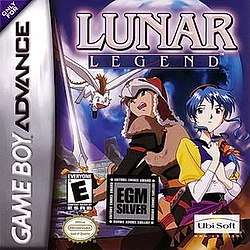Lunar Legend
| Lunar Legend | |
|---|---|
 | |
| Developer(s) | Japan Art Media |
| Publisher(s) | |
| Composer(s) | Noriyuki Iwadare |
| Series | Lunar |
| Platform(s) | Game Boy Advance |
| Release |
JPN April 12, 2002 NA December 10, 2002 |
| Genre(s) | Role-playing video game |
| Mode(s) | Single-player |
Lunar Legend (ルナレジェンド) is a role-playing video game for Nintendo's Game Boy Advance developed by Japan Art Media and published internationally by Ubisoft, who also provided the translation. It is a re-telling of the events of Lunar: The Silver Star with story and content changes. All the characters from the original game appear.
Development and release
Lunar Legend is a re-made version of Lunar: Silver Star Story Complete for the Game Boy Advance and was developed by Media Rings Corporation after acquiring the rights to produce a handheld adaptation of Game Arts' role-playing game. The game was announced in a November 2001 issue of Japanese Weekly Famitsu magazine as a "powered up" version of the original Sega-CD and the 32-bit versions, with changes that would benefit players on the go and provide new story materials for veteran fans.[1] Because of the game's limited 8-megabyte cart size, many features standard to the Lunar series such as voice acting and video sequences were omitted, with Media Rings instead utilizing real-time cutscenes using larger, more detailed character sprites to tell the story. Still images taken directly from Silver Star Story Complete's animated videos would appear at certain points during the game to give it a more cinematic feel.[2] Game Arts' primary goal in co-developing the new version was to provide the previous game's music, art, and script for Media Ring's use.[3] The Lunar series' producer Yoichi Miyaji joined the development team as a consultant, along with several other members of the Game Arts staff, in assisting project director Hisashi Sugawara in crafting a new vision of the game that would retain the same feel as previous adaptations. The game was originally scheduled for a March 2002 release, but was pushed back to the following April for last-minute changes.[4]
The North American version became the first English Lunar title to not be produced by Working Designs, with company president Victor Ireland passing on the project for undisclosed reasons.[3] During the 2002 IEMA Executive Summit, Ubisoft announced they had acquired the publishing rights to Lunar Legend, with an initial release date of November 2002.[3] Ubisoft's script remained closer to the original Japanese version than previous English endeavors, but retained Working Designs' character names and overall light-hearted tone. Rather than develop their own official Lunar Legend website, Ubisoft approached Mickey Shannon, webmaster of Lunar series fansite LunarNET, to create and host the game's official English page on his server.[5]
Reception
| Reception | ||||||||||||||||||||||||
|---|---|---|---|---|---|---|---|---|---|---|---|---|---|---|---|---|---|---|---|---|---|---|---|---|
| ||||||||||||||||||||||||
Lunar Legend received an above-average total score of 30 out of 40 from four reviewers in Japanese Weekly Famitsu magazine.[9] The game was mostly well-received in North America, with some critics such as Electronic Gaming Monthly commending its re-drawn, animated character sprites, describing the game as "one of the prettiest, most involving RPGs to hit the GBA".[14] GameSpot similarly declared that the game was "fun and engaging", but found the low difficulty lacking in challenge and the audio quality below the standard, commenting that the "generic battle sounds and forgettable music don't leave much of an impression".[15] In 2003, Lunar Legend was nominated for Best Role-Playing Game on the Game Boy Advance in GameSpot's "Best and Worst of 2002" awards.[16]
Reviewers often compared the game to its PlayStation predecessor. GamePro saw the game as inferior to its earlier versions, stating that it was "definitely recommended for anyone who didn't live through the Lunar phenomenon, [but] anyone who's played the original is bound to be disappointed", finding fault in the game's lower quality presentation.[17] Game Informer called the game a "solid port" with good enhancements, yet felt that the exclusion of voice-overs and animated cutscenes from the original hurt the game's narrative.[18]
References
- ↑ Gantayat, Anoop (2001-11-09). "First Look: Lunar Legend". IGN. Retrieved 2008-07-01.
- ↑ Editors of Nintendo Power (March 2003). Nintendo Power (issue 165). Future US. p. 138.
- 1 2 3 Kirk, Nicole Monet (2002-07-30). "Lunar: Legend Gets US Publisher". RPGFan. Retrieved 2008-07-01.
- ↑ C., Eve (2002-02-15). "Lunar: Legend Delayed". RPGFan. Retrieved 2008-07-01.
- ↑ Farand, Eric (2008-01-10). "LunarNET/RPGFan Turns 10 Years Old". RPGFan. Retrieved 2008-07-01.
- ↑ "Lunar Legend Reviews". GameRankings. Retrieved 2008-07-01.
- ↑ "Lunar Legend (gba: 2002): Reviews". GameRankings. Retrieved 2008-07-01.
- ↑ "Lunar Legend Review". Electronic Gaming Monthly. San Francisco, California: Ziff Davis Media (161). December 2002.
- 1 2 Editors of Famitsu Magazine (April 14, 2002). Weekly Famitsu. Enterbrain, Inc.
- ↑ Barber, Chet (February 2003). "Lunar Legend Review". Game Informer. GameStop Corporation (138). Archived from the original on 2008-02-12.
- ↑ Star Dingo (November 2002). "Review: Lunar Legend [Game Boy Advance]". GamePro. IDG Entertainment (170).
- ↑ Kasavin, Greg (2003-01-02). "Lunar Legend for Game Boy Advance Review". GameSpot. Retrieved 2008-07-01.
- ↑ Harris, Craig (2003-02-03). "IGN: Lunar Legend Review". IGN. Retrieved 2008-07-01.
- ↑ Editors of Electronic Gaming Monthly (December 2002). Electronic Gaming Monthly (issue 161). Ziff Davis Media. p. 272.
- ↑ Kasavin, Greg (2003-01-02). "Lunar Legend for Game Boy Advance Review". GameSpot. Retrieved 2008-07-01.
- ↑ "Best Role-Playing Game on Game Boy Advance, Nominees". GameSpot. 2003. Retrieved 2008-07-01.
- ↑ Star Dingo (November 2002). GamePro Magazine (issue 170. IDG Entertainment.
- ↑ Barber, Chet (February 2003). Game Informer (issue 138). GameStop Corporation. p. 108.
External links
- Lunar Legend at LunarNET
- Official website (in Japanese)
- Lunar Legend at MobyGames